Entrepreneurship and Small Business Management: Joe Woods
VerifiedAdded on 2021/01/02
|15
|5011
|328
AI Summary
Contribute Materials
Your contribution can guide someone’s learning journey. Share your
documents today.
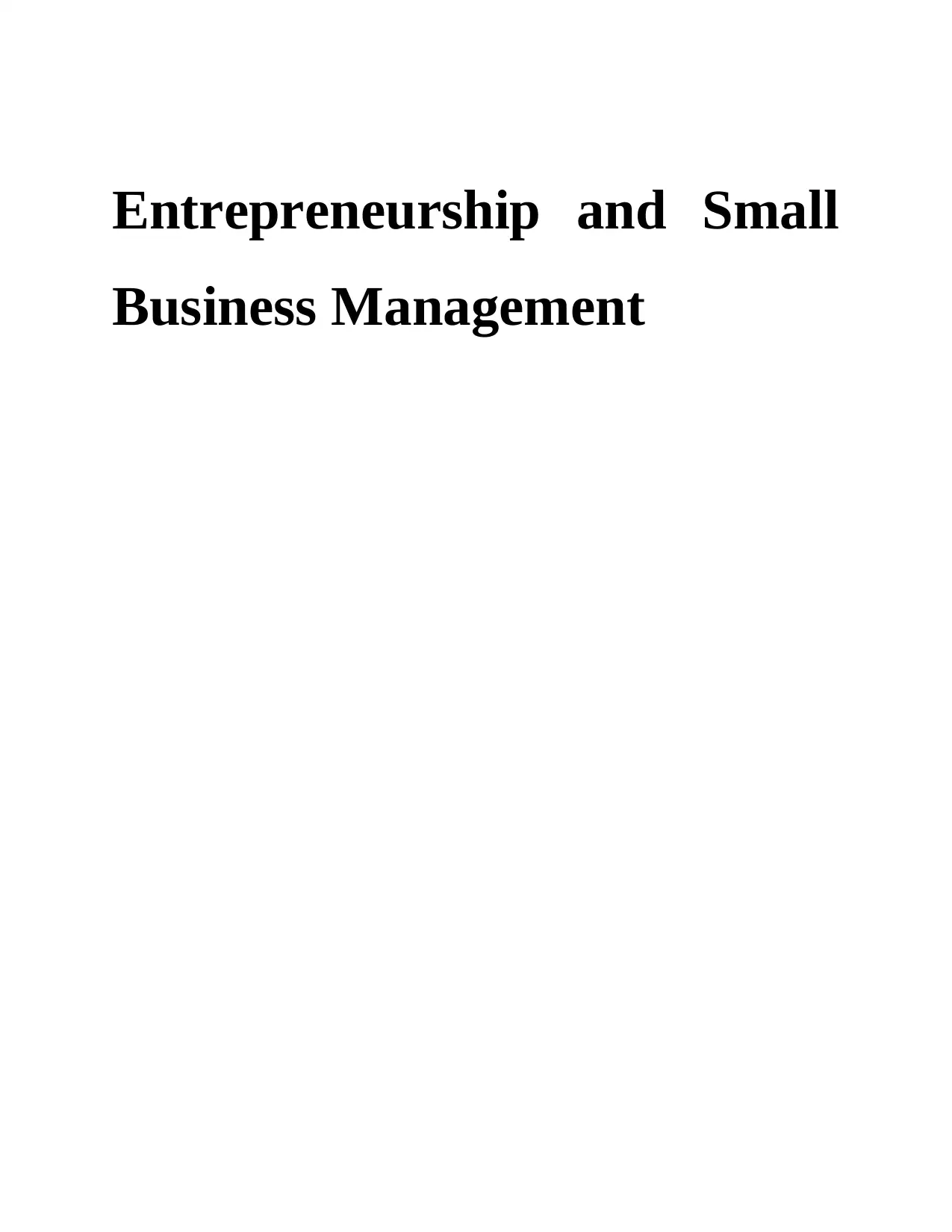
Entrepreneurship and Small
Business Management
Business Management
Secure Best Marks with AI Grader
Need help grading? Try our AI Grader for instant feedback on your assignments.
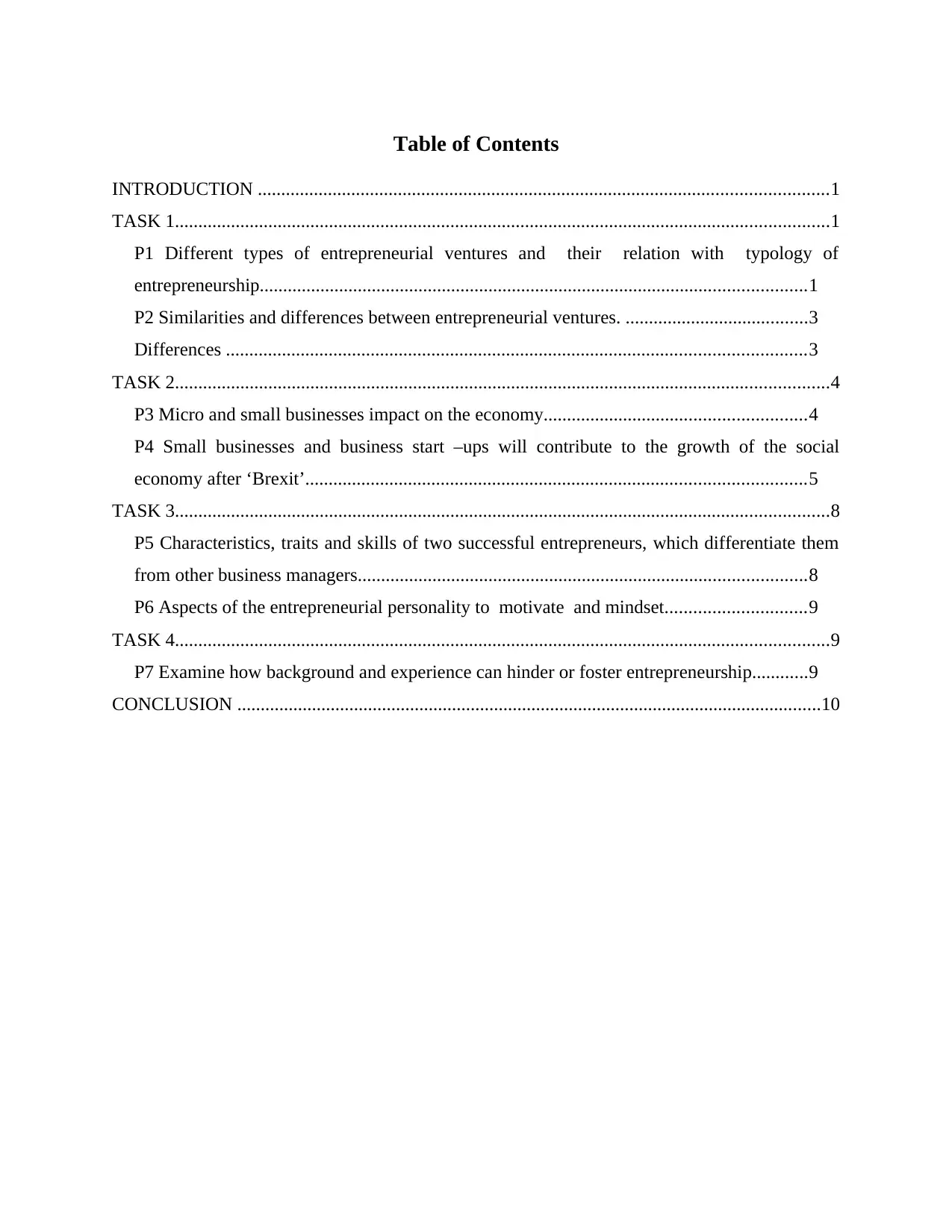
Table of Contents
INTRODUCTION ..........................................................................................................................1
TASK 1............................................................................................................................................1
P1 Different types of entrepreneurial ventures and their relation with typology of
entrepreneurship.....................................................................................................................1
P2 Similarities and differences between entrepreneurial ventures. .......................................3
Differences ............................................................................................................................3
TASK 2............................................................................................................................................4
P3 Micro and small businesses impact on the economy........................................................4
P4 Small businesses and business start –ups will contribute to the growth of the social
economy after ‘Brexit’...........................................................................................................5
TASK 3............................................................................................................................................8
P5 Characteristics, traits and skills of two successful entrepreneurs, which differentiate them
from other business managers................................................................................................8
P6 Aspects of the entrepreneurial personality to motivate and mindset..............................9
TASK 4............................................................................................................................................9
P7 Examine how background and experience can hinder or foster entrepreneurship............9
CONCLUSION .............................................................................................................................10
INTRODUCTION ..........................................................................................................................1
TASK 1............................................................................................................................................1
P1 Different types of entrepreneurial ventures and their relation with typology of
entrepreneurship.....................................................................................................................1
P2 Similarities and differences between entrepreneurial ventures. .......................................3
Differences ............................................................................................................................3
TASK 2............................................................................................................................................4
P3 Micro and small businesses impact on the economy........................................................4
P4 Small businesses and business start –ups will contribute to the growth of the social
economy after ‘Brexit’...........................................................................................................5
TASK 3............................................................................................................................................8
P5 Characteristics, traits and skills of two successful entrepreneurs, which differentiate them
from other business managers................................................................................................8
P6 Aspects of the entrepreneurial personality to motivate and mindset..............................9
TASK 4............................................................................................................................................9
P7 Examine how background and experience can hinder or foster entrepreneurship............9
CONCLUSION .............................................................................................................................10
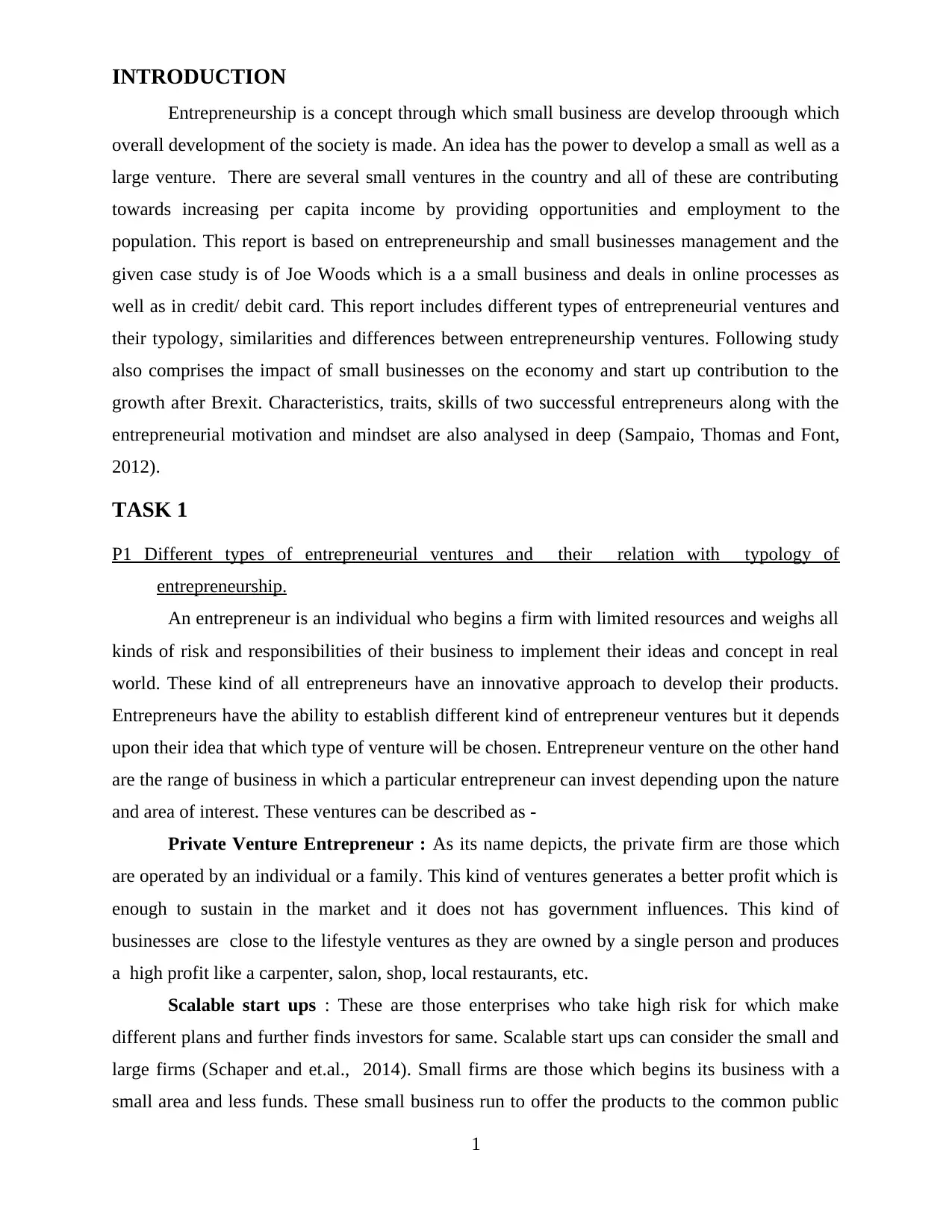
INTRODUCTION
Entrepreneurship is a concept through which small business are develop throough which
overall development of the society is made. An idea has the power to develop a small as well as a
large venture. There are several small ventures in the country and all of these are contributing
towards increasing per capita income by providing opportunities and employment to the
population. This report is based on entrepreneurship and small businesses management and the
given case study is of Joe Woods which is a a small business and deals in online processes as
well as in credit/ debit card. This report includes different types of entrepreneurial ventures and
their typology, similarities and differences between entrepreneurship ventures. Following study
also comprises the impact of small businesses on the economy and start up contribution to the
growth after Brexit. Characteristics, traits, skills of two successful entrepreneurs along with the
entrepreneurial motivation and mindset are also analysed in deep (Sampaio, Thomas and Font,
2012).
TASK 1
P1 Different types of entrepreneurial ventures and their relation with typology of
entrepreneurship.
An entrepreneur is an individual who begins a firm with limited resources and weighs all
kinds of risk and responsibilities of their business to implement their ideas and concept in real
world. These kind of all entrepreneurs have an innovative approach to develop their products.
Entrepreneurs have the ability to establish different kind of entrepreneur ventures but it depends
upon their idea that which type of venture will be chosen. Entrepreneur venture on the other hand
are the range of business in which a particular entrepreneur can invest depending upon the nature
and area of interest. These ventures can be described as -
Private Venture Entrepreneur : As its name depicts, the private firm are those which
are operated by an individual or a family. This kind of ventures generates a better profit which is
enough to sustain in the market and it does not has government influences. This kind of
businesses are close to the lifestyle ventures as they are owned by a single person and produces
a high profit like a carpenter, salon, shop, local restaurants, etc.
Scalable start ups : These are those enterprises who take high risk for which make
different plans and further finds investors for same. Scalable start ups can consider the small and
large firms (Schaper and et.al., 2014). Small firms are those which begins its business with a
small area and less funds. These small business run to offer the products to the common public
1
Entrepreneurship is a concept through which small business are develop throough which
overall development of the society is made. An idea has the power to develop a small as well as a
large venture. There are several small ventures in the country and all of these are contributing
towards increasing per capita income by providing opportunities and employment to the
population. This report is based on entrepreneurship and small businesses management and the
given case study is of Joe Woods which is a a small business and deals in online processes as
well as in credit/ debit card. This report includes different types of entrepreneurial ventures and
their typology, similarities and differences between entrepreneurship ventures. Following study
also comprises the impact of small businesses on the economy and start up contribution to the
growth after Brexit. Characteristics, traits, skills of two successful entrepreneurs along with the
entrepreneurial motivation and mindset are also analysed in deep (Sampaio, Thomas and Font,
2012).
TASK 1
P1 Different types of entrepreneurial ventures and their relation with typology of
entrepreneurship.
An entrepreneur is an individual who begins a firm with limited resources and weighs all
kinds of risk and responsibilities of their business to implement their ideas and concept in real
world. These kind of all entrepreneurs have an innovative approach to develop their products.
Entrepreneurs have the ability to establish different kind of entrepreneur ventures but it depends
upon their idea that which type of venture will be chosen. Entrepreneur venture on the other hand
are the range of business in which a particular entrepreneur can invest depending upon the nature
and area of interest. These ventures can be described as -
Private Venture Entrepreneur : As its name depicts, the private firm are those which
are operated by an individual or a family. This kind of ventures generates a better profit which is
enough to sustain in the market and it does not has government influences. This kind of
businesses are close to the lifestyle ventures as they are owned by a single person and produces
a high profit like a carpenter, salon, shop, local restaurants, etc.
Scalable start ups : These are those enterprises who take high risk for which make
different plans and further finds investors for same. Scalable start ups can consider the small and
large firms (Schaper and et.al., 2014). Small firms are those which begins its business with a
small area and less funds. These small business run to offer the products to the common public
1
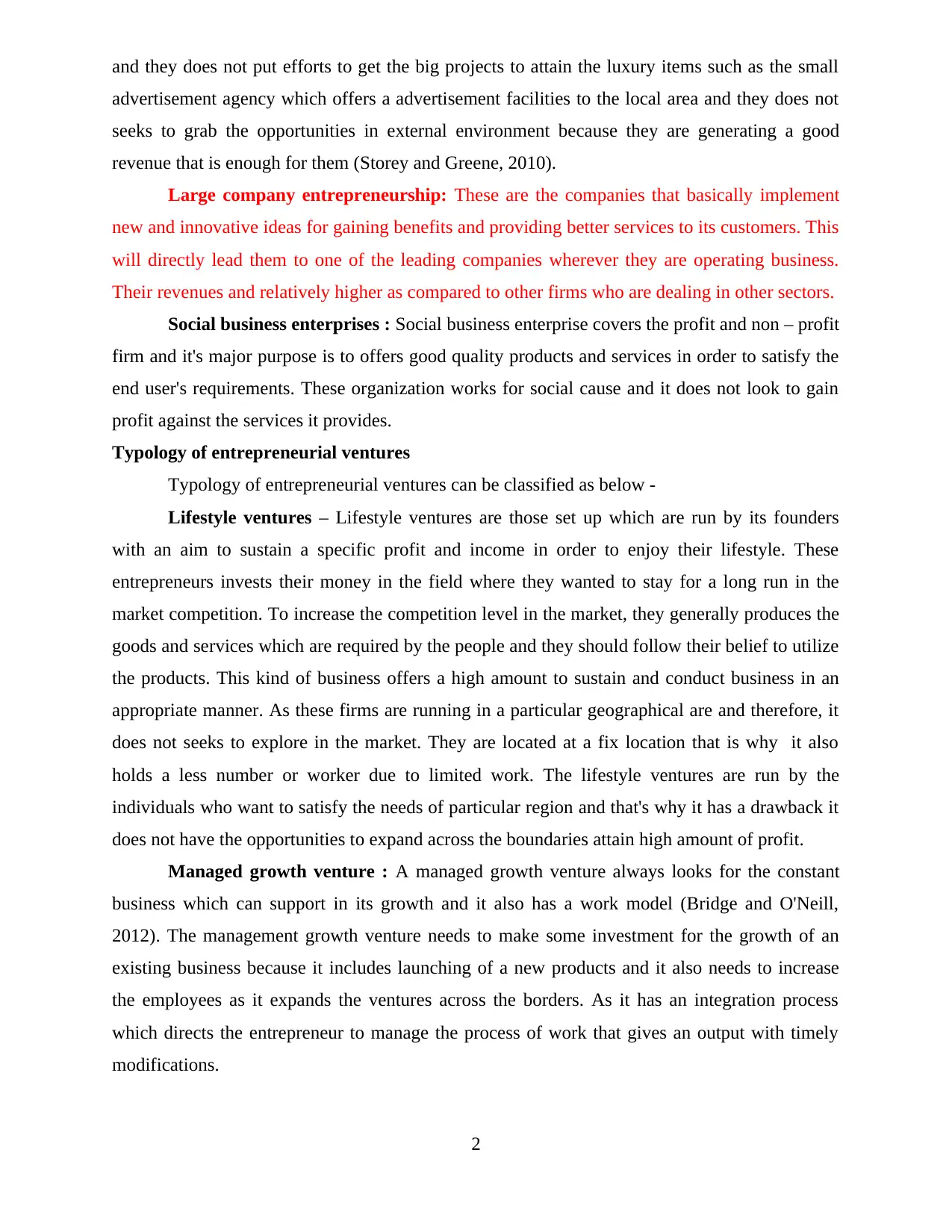
and they does not put efforts to get the big projects to attain the luxury items such as the small
advertisement agency which offers a advertisement facilities to the local area and they does not
seeks to grab the opportunities in external environment because they are generating a good
revenue that is enough for them (Storey and Greene, 2010).
Large company entrepreneurship: These are the companies that basically implement
new and innovative ideas for gaining benefits and providing better services to its customers. This
will directly lead them to one of the leading companies wherever they are operating business.
Their revenues and relatively higher as compared to other firms who are dealing in other sectors.
Social business enterprises : Social business enterprise covers the profit and non – profit
firm and it's major purpose is to offers good quality products and services in order to satisfy the
end user's requirements. These organization works for social cause and it does not look to gain
profit against the services it provides.
Typology of entrepreneurial ventures
Typology of entrepreneurial ventures can be classified as below -
Lifestyle ventures – Lifestyle ventures are those set up which are run by its founders
with an aim to sustain a specific profit and income in order to enjoy their lifestyle. These
entrepreneurs invests their money in the field where they wanted to stay for a long run in the
market competition. To increase the competition level in the market, they generally produces the
goods and services which are required by the people and they should follow their belief to utilize
the products. This kind of business offers a high amount to sustain and conduct business in an
appropriate manner. As these firms are running in a particular geographical are and therefore, it
does not seeks to explore in the market. They are located at a fix location that is why it also
holds a less number or worker due to limited work. The lifestyle ventures are run by the
individuals who want to satisfy the needs of particular region and that's why it has a drawback it
does not have the opportunities to expand across the boundaries attain high amount of profit.
Managed growth venture : A managed growth venture always looks for the constant
business which can support in its growth and it also has a work model (Bridge and O'Neill,
2012). The management growth venture needs to make some investment for the growth of an
existing business because it includes launching of a new products and it also needs to increase
the employees as it expands the ventures across the borders. As it has an integration process
which directs the entrepreneur to manage the process of work that gives an output with timely
modifications.
2
advertisement agency which offers a advertisement facilities to the local area and they does not
seeks to grab the opportunities in external environment because they are generating a good
revenue that is enough for them (Storey and Greene, 2010).
Large company entrepreneurship: These are the companies that basically implement
new and innovative ideas for gaining benefits and providing better services to its customers. This
will directly lead them to one of the leading companies wherever they are operating business.
Their revenues and relatively higher as compared to other firms who are dealing in other sectors.
Social business enterprises : Social business enterprise covers the profit and non – profit
firm and it's major purpose is to offers good quality products and services in order to satisfy the
end user's requirements. These organization works for social cause and it does not look to gain
profit against the services it provides.
Typology of entrepreneurial ventures
Typology of entrepreneurial ventures can be classified as below -
Lifestyle ventures – Lifestyle ventures are those set up which are run by its founders
with an aim to sustain a specific profit and income in order to enjoy their lifestyle. These
entrepreneurs invests their money in the field where they wanted to stay for a long run in the
market competition. To increase the competition level in the market, they generally produces the
goods and services which are required by the people and they should follow their belief to utilize
the products. This kind of business offers a high amount to sustain and conduct business in an
appropriate manner. As these firms are running in a particular geographical are and therefore, it
does not seeks to explore in the market. They are located at a fix location that is why it also
holds a less number or worker due to limited work. The lifestyle ventures are run by the
individuals who want to satisfy the needs of particular region and that's why it has a drawback it
does not have the opportunities to expand across the boundaries attain high amount of profit.
Managed growth venture : A managed growth venture always looks for the constant
business which can support in its growth and it also has a work model (Bridge and O'Neill,
2012). The management growth venture needs to make some investment for the growth of an
existing business because it includes launching of a new products and it also needs to increase
the employees as it expands the ventures across the borders. As it has an integration process
which directs the entrepreneur to manage the process of work that gives an output with timely
modifications.
2
Secure Best Marks with AI Grader
Need help grading? Try our AI Grader for instant feedback on your assignments.
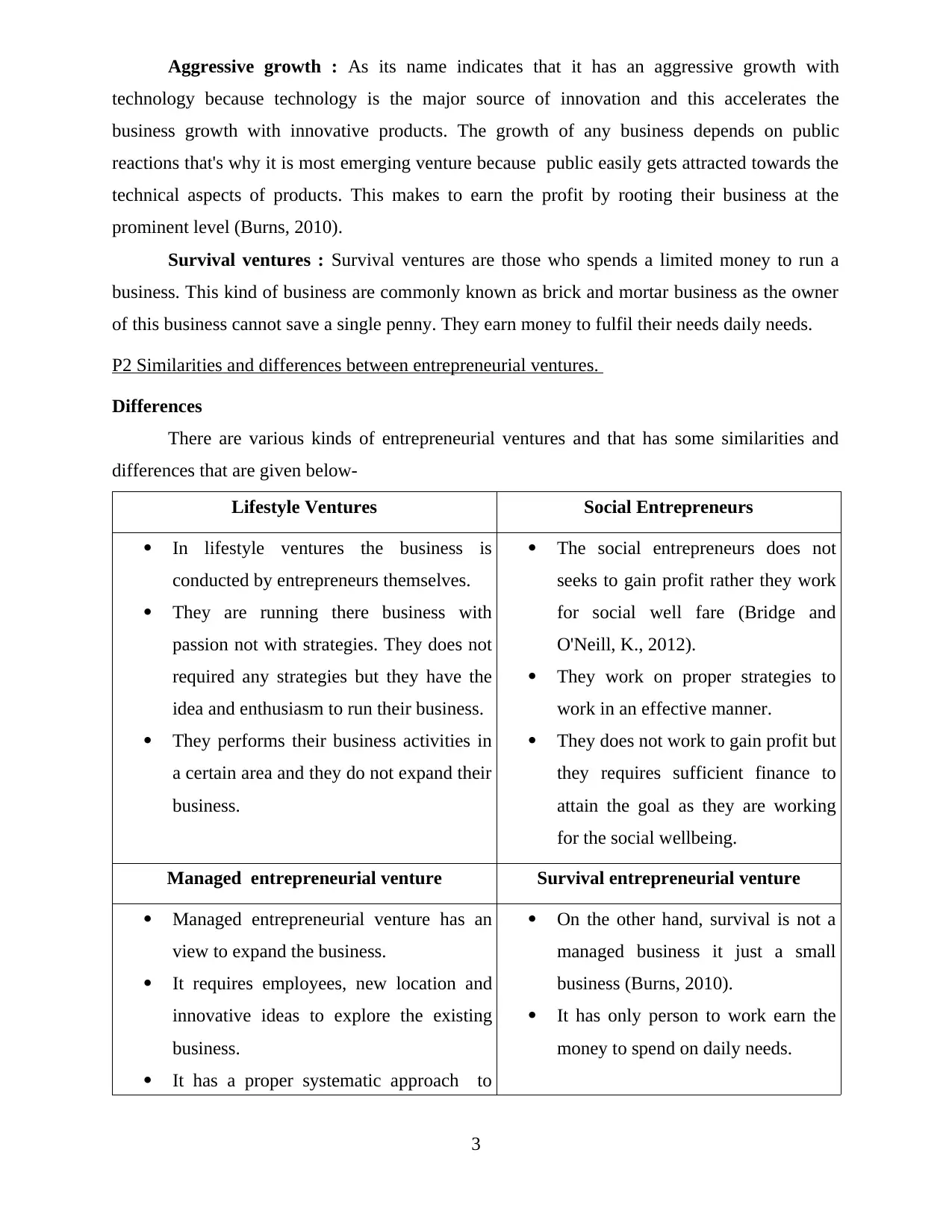
Aggressive growth : As its name indicates that it has an aggressive growth with
technology because technology is the major source of innovation and this accelerates the
business growth with innovative products. The growth of any business depends on public
reactions that's why it is most emerging venture because public easily gets attracted towards the
technical aspects of products. This makes to earn the profit by rooting their business at the
prominent level (Burns, 2010).
Survival ventures : Survival ventures are those who spends a limited money to run a
business. This kind of business are commonly known as brick and mortar business as the owner
of this business cannot save a single penny. They earn money to fulfil their needs daily needs.
P2 Similarities and differences between entrepreneurial ventures.
Differences
There are various kinds of entrepreneurial ventures and that has some similarities and
differences that are given below-
Lifestyle Ventures Social Entrepreneurs
In lifestyle ventures the business is
conducted by entrepreneurs themselves.
They are running there business with
passion not with strategies. They does not
required any strategies but they have the
idea and enthusiasm to run their business.
They performs their business activities in
a certain area and they do not expand their
business.
The social entrepreneurs does not
seeks to gain profit rather they work
for social well fare (Bridge and
O'Neill, K., 2012).
They work on proper strategies to
work in an effective manner.
They does not work to gain profit but
they requires sufficient finance to
attain the goal as they are working
for the social wellbeing.
Managed entrepreneurial venture Survival entrepreneurial venture
Managed entrepreneurial venture has an
view to expand the business.
It requires employees, new location and
innovative ideas to explore the existing
business.
It has a proper systematic approach to
On the other hand, survival is not a
managed business it just a small
business (Burns, 2010).
It has only person to work earn the
money to spend on daily needs.
3
technology because technology is the major source of innovation and this accelerates the
business growth with innovative products. The growth of any business depends on public
reactions that's why it is most emerging venture because public easily gets attracted towards the
technical aspects of products. This makes to earn the profit by rooting their business at the
prominent level (Burns, 2010).
Survival ventures : Survival ventures are those who spends a limited money to run a
business. This kind of business are commonly known as brick and mortar business as the owner
of this business cannot save a single penny. They earn money to fulfil their needs daily needs.
P2 Similarities and differences between entrepreneurial ventures.
Differences
There are various kinds of entrepreneurial ventures and that has some similarities and
differences that are given below-
Lifestyle Ventures Social Entrepreneurs
In lifestyle ventures the business is
conducted by entrepreneurs themselves.
They are running there business with
passion not with strategies. They does not
required any strategies but they have the
idea and enthusiasm to run their business.
They performs their business activities in
a certain area and they do not expand their
business.
The social entrepreneurs does not
seeks to gain profit rather they work
for social well fare (Bridge and
O'Neill, K., 2012).
They work on proper strategies to
work in an effective manner.
They does not work to gain profit but
they requires sufficient finance to
attain the goal as they are working
for the social wellbeing.
Managed entrepreneurial venture Survival entrepreneurial venture
Managed entrepreneurial venture has an
view to expand the business.
It requires employees, new location and
innovative ideas to explore the existing
business.
It has a proper systematic approach to
On the other hand, survival is not a
managed business it just a small
business (Burns, 2010).
It has only person to work earn the
money to spend on daily needs.
3
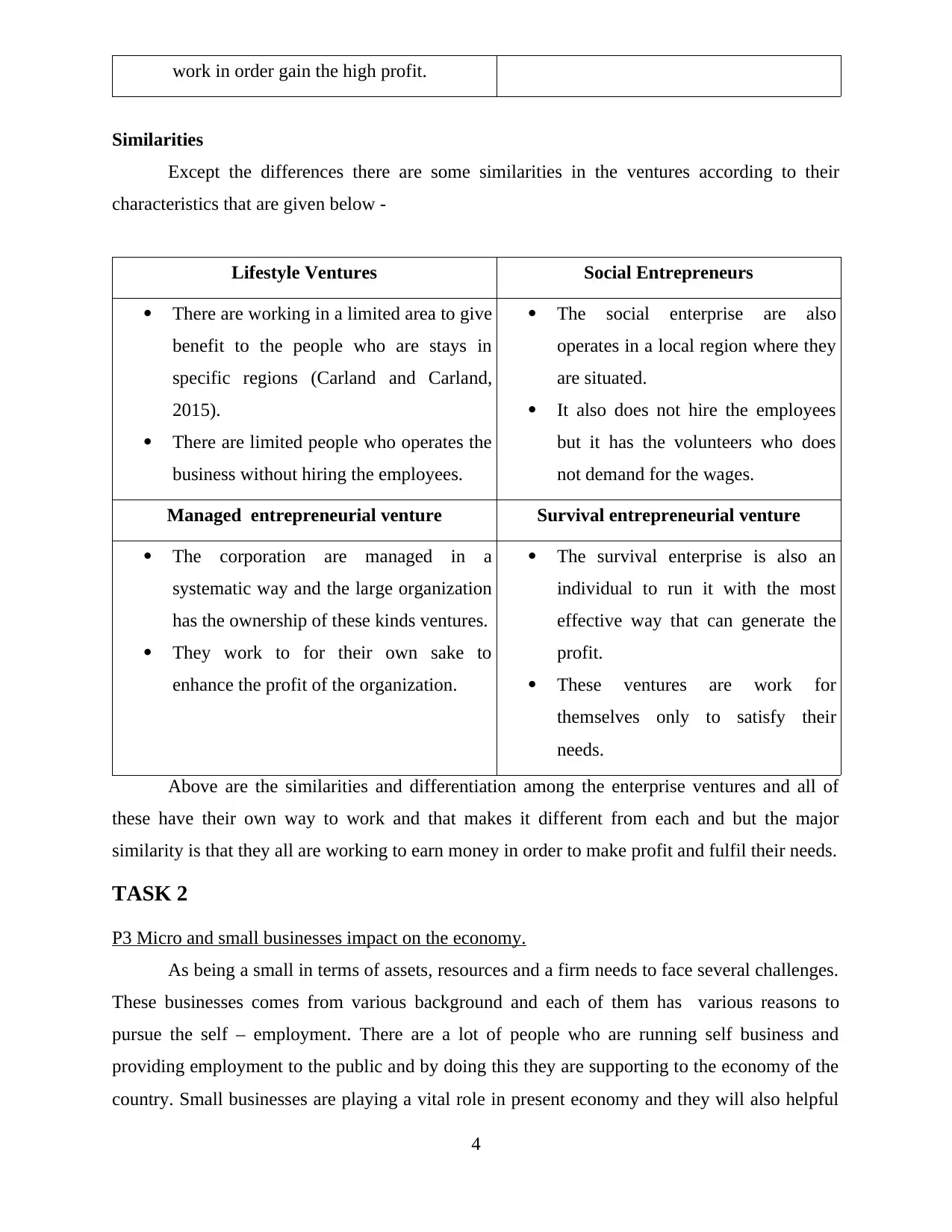
work in order gain the high profit.
Similarities
Except the differences there are some similarities in the ventures according to their
characteristics that are given below -
Lifestyle Ventures Social Entrepreneurs
There are working in a limited area to give
benefit to the people who are stays in
specific regions (Carland and Carland,
2015).
There are limited people who operates the
business without hiring the employees.
The social enterprise are also
operates in a local region where they
are situated.
It also does not hire the employees
but it has the volunteers who does
not demand for the wages.
Managed entrepreneurial venture Survival entrepreneurial venture
The corporation are managed in a
systematic way and the large organization
has the ownership of these kinds ventures.
They work to for their own sake to
enhance the profit of the organization.
The survival enterprise is also an
individual to run it with the most
effective way that can generate the
profit.
These ventures are work for
themselves only to satisfy their
needs.
Above are the similarities and differentiation among the enterprise ventures and all of
these have their own way to work and that makes it different from each and but the major
similarity is that they all are working to earn money in order to make profit and fulfil their needs.
TASK 2
P3 Micro and small businesses impact on the economy.
As being a small in terms of assets, resources and a firm needs to face several challenges.
These businesses comes from various background and each of them has various reasons to
pursue the self – employment. There are a lot of people who are running self business and
providing employment to the public and by doing this they are supporting to the economy of the
country. Small businesses are playing a vital role in present economy and they will also helpful
4
Similarities
Except the differences there are some similarities in the ventures according to their
characteristics that are given below -
Lifestyle Ventures Social Entrepreneurs
There are working in a limited area to give
benefit to the people who are stays in
specific regions (Carland and Carland,
2015).
There are limited people who operates the
business without hiring the employees.
The social enterprise are also
operates in a local region where they
are situated.
It also does not hire the employees
but it has the volunteers who does
not demand for the wages.
Managed entrepreneurial venture Survival entrepreneurial venture
The corporation are managed in a
systematic way and the large organization
has the ownership of these kinds ventures.
They work to for their own sake to
enhance the profit of the organization.
The survival enterprise is also an
individual to run it with the most
effective way that can generate the
profit.
These ventures are work for
themselves only to satisfy their
needs.
Above are the similarities and differentiation among the enterprise ventures and all of
these have their own way to work and that makes it different from each and but the major
similarity is that they all are working to earn money in order to make profit and fulfil their needs.
TASK 2
P3 Micro and small businesses impact on the economy.
As being a small in terms of assets, resources and a firm needs to face several challenges.
These businesses comes from various background and each of them has various reasons to
pursue the self – employment. There are a lot of people who are running self business and
providing employment to the public and by doing this they are supporting to the economy of the
country. Small businesses are playing a vital role in present economy and they will also helpful
4
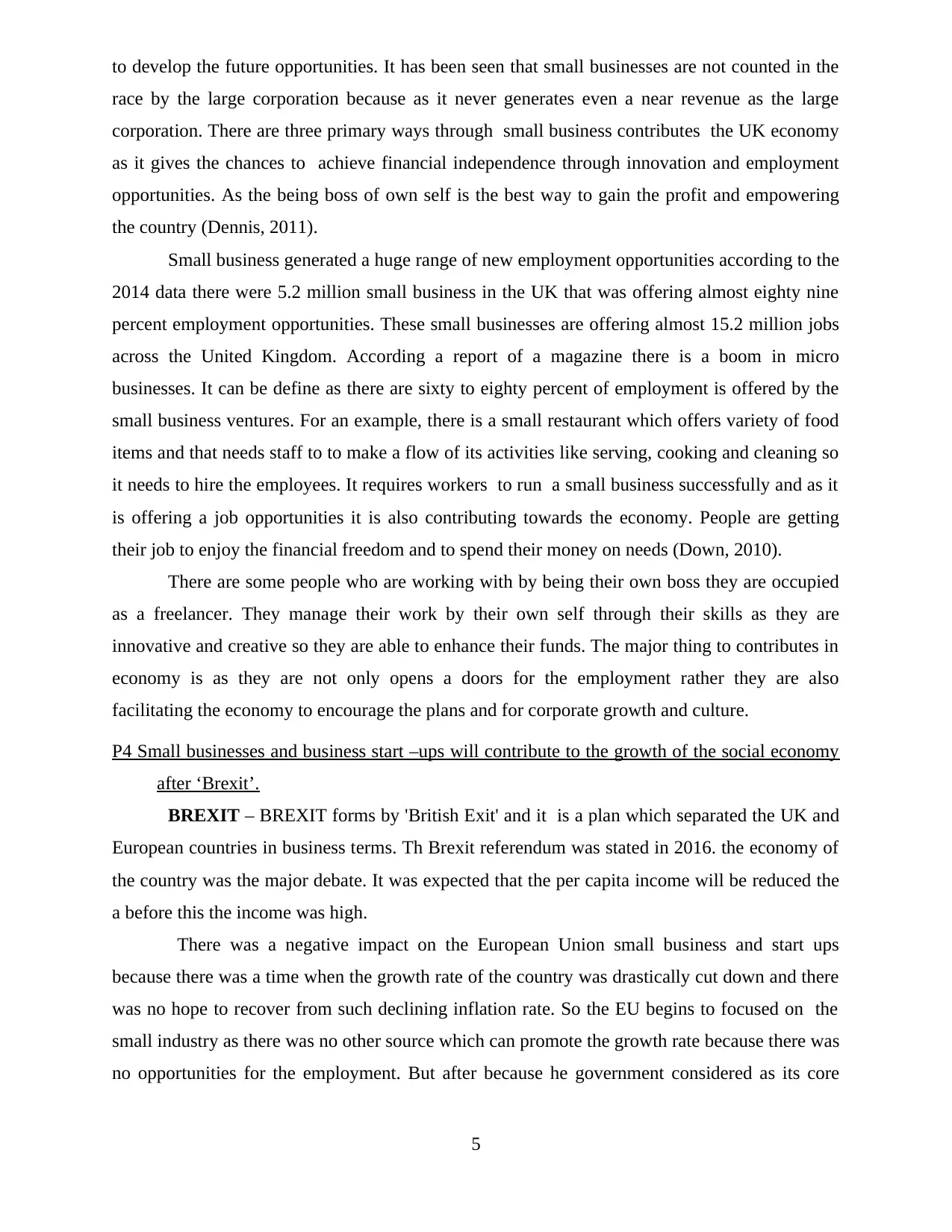
to develop the future opportunities. It has been seen that small businesses are not counted in the
race by the large corporation because as it never generates even a near revenue as the large
corporation. There are three primary ways through small business contributes the UK economy
as it gives the chances to achieve financial independence through innovation and employment
opportunities. As the being boss of own self is the best way to gain the profit and empowering
the country (Dennis, 2011).
Small business generated a huge range of new employment opportunities according to the
2014 data there were 5.2 million small business in the UK that was offering almost eighty nine
percent employment opportunities. These small businesses are offering almost 15.2 million jobs
across the United Kingdom. According a report of a magazine there is a boom in micro
businesses. It can be define as there are sixty to eighty percent of employment is offered by the
small business ventures. For an example, there is a small restaurant which offers variety of food
items and that needs staff to to make a flow of its activities like serving, cooking and cleaning so
it needs to hire the employees. It requires workers to run a small business successfully and as it
is offering a job opportunities it is also contributing towards the economy. People are getting
their job to enjoy the financial freedom and to spend their money on needs (Down, 2010).
There are some people who are working with by being their own boss they are occupied
as a freelancer. They manage their work by their own self through their skills as they are
innovative and creative so they are able to enhance their funds. The major thing to contributes in
economy is as they are not only opens a doors for the employment rather they are also
facilitating the economy to encourage the plans and for corporate growth and culture.
P4 Small businesses and business start –ups will contribute to the growth of the social economy
after ‘Brexit’.
BREXIT – BREXIT forms by 'British Exit' and it is a plan which separated the UK and
European countries in business terms. Th Brexit referendum was stated in 2016. the economy of
the country was the major debate. It was expected that the per capita income will be reduced the
a before this the income was high.
There was a negative impact on the European Union small business and start ups
because there was a time when the growth rate of the country was drastically cut down and there
was no hope to recover from such declining inflation rate. So the EU begins to focused on the
small industry as there was no other source which can promote the growth rate because there was
no opportunities for the employment. But after because he government considered as its core
5
race by the large corporation because as it never generates even a near revenue as the large
corporation. There are three primary ways through small business contributes the UK economy
as it gives the chances to achieve financial independence through innovation and employment
opportunities. As the being boss of own self is the best way to gain the profit and empowering
the country (Dennis, 2011).
Small business generated a huge range of new employment opportunities according to the
2014 data there were 5.2 million small business in the UK that was offering almost eighty nine
percent employment opportunities. These small businesses are offering almost 15.2 million jobs
across the United Kingdom. According a report of a magazine there is a boom in micro
businesses. It can be define as there are sixty to eighty percent of employment is offered by the
small business ventures. For an example, there is a small restaurant which offers variety of food
items and that needs staff to to make a flow of its activities like serving, cooking and cleaning so
it needs to hire the employees. It requires workers to run a small business successfully and as it
is offering a job opportunities it is also contributing towards the economy. People are getting
their job to enjoy the financial freedom and to spend their money on needs (Down, 2010).
There are some people who are working with by being their own boss they are occupied
as a freelancer. They manage their work by their own self through their skills as they are
innovative and creative so they are able to enhance their funds. The major thing to contributes in
economy is as they are not only opens a doors for the employment rather they are also
facilitating the economy to encourage the plans and for corporate growth and culture.
P4 Small businesses and business start –ups will contribute to the growth of the social economy
after ‘Brexit’.
BREXIT – BREXIT forms by 'British Exit' and it is a plan which separated the UK and
European countries in business terms. Th Brexit referendum was stated in 2016. the economy of
the country was the major debate. It was expected that the per capita income will be reduced the
a before this the income was high.
There was a negative impact on the European Union small business and start ups
because there was a time when the growth rate of the country was drastically cut down and there
was no hope to recover from such declining inflation rate. So the EU begins to focused on the
small industry as there was no other source which can promote the growth rate because there was
no opportunities for the employment. But after because he government considered as its core
5
Paraphrase This Document
Need a fresh take? Get an instant paraphrase of this document with our AI Paraphraser
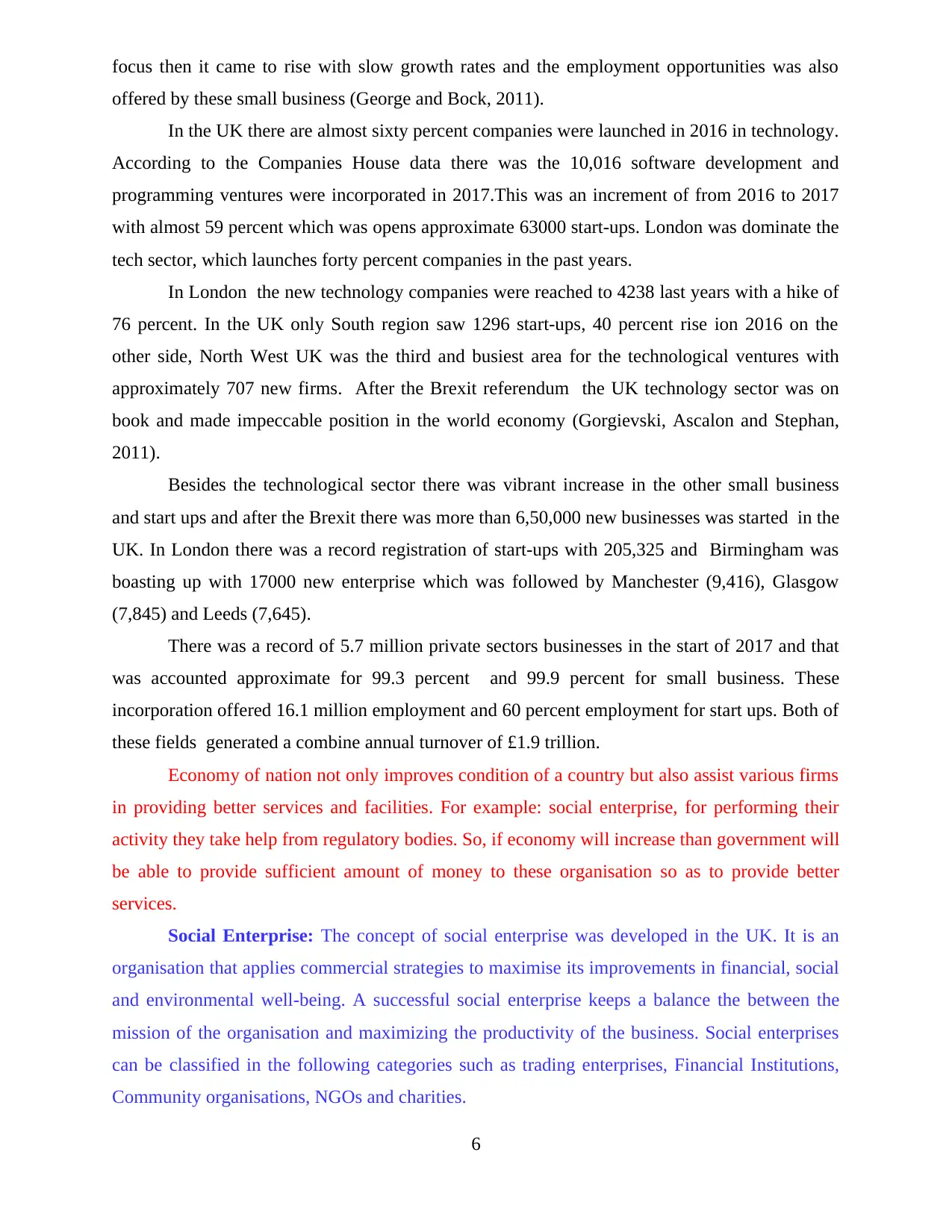
focus then it came to rise with slow growth rates and the employment opportunities was also
offered by these small business (George and Bock, 2011).
In the UK there are almost sixty percent companies were launched in 2016 in technology.
According to the Companies House data there was the 10,016 software development and
programming ventures were incorporated in 2017.This was an increment of from 2016 to 2017
with almost 59 percent which was opens approximate 63000 start-ups. London was dominate the
tech sector, which launches forty percent companies in the past years.
In London the new technology companies were reached to 4238 last years with a hike of
76 percent. In the UK only South region saw 1296 start-ups, 40 percent rise ion 2016 on the
other side, North West UK was the third and busiest area for the technological ventures with
approximately 707 new firms. After the Brexit referendum the UK technology sector was on
book and made impeccable position in the world economy (Gorgievski, Ascalon and Stephan,
2011).
Besides the technological sector there was vibrant increase in the other small business
and start ups and after the Brexit there was more than 6,50,000 new businesses was started in the
UK. In London there was a record registration of start-ups with 205,325 and Birmingham was
boasting up with 17000 new enterprise which was followed by Manchester (9,416), Glasgow
(7,845) and Leeds (7,645).
There was a record of 5.7 million private sectors businesses in the start of 2017 and that
was accounted approximate for 99.3 percent and 99.9 percent for small business. These
incorporation offered 16.1 million employment and 60 percent employment for start ups. Both of
these fields generated a combine annual turnover of £1.9 trillion.
Economy of nation not only improves condition of a country but also assist various firms
in providing better services and facilities. For example: social enterprise, for performing their
activity they take help from regulatory bodies. So, if economy will increase than government will
be able to provide sufficient amount of money to these organisation so as to provide better
services.
Social Enterprise: The concept of social enterprise was developed in the UK. It is an
organisation that applies commercial strategies to maximise its improvements in financial, social
and environmental well-being. A successful social enterprise keeps a balance the between the
mission of the organisation and maximizing the productivity of the business. Social enterprises
can be classified in the following categories such as trading enterprises, Financial Institutions,
Community organisations, NGOs and charities.
6
offered by these small business (George and Bock, 2011).
In the UK there are almost sixty percent companies were launched in 2016 in technology.
According to the Companies House data there was the 10,016 software development and
programming ventures were incorporated in 2017.This was an increment of from 2016 to 2017
with almost 59 percent which was opens approximate 63000 start-ups. London was dominate the
tech sector, which launches forty percent companies in the past years.
In London the new technology companies were reached to 4238 last years with a hike of
76 percent. In the UK only South region saw 1296 start-ups, 40 percent rise ion 2016 on the
other side, North West UK was the third and busiest area for the technological ventures with
approximately 707 new firms. After the Brexit referendum the UK technology sector was on
book and made impeccable position in the world economy (Gorgievski, Ascalon and Stephan,
2011).
Besides the technological sector there was vibrant increase in the other small business
and start ups and after the Brexit there was more than 6,50,000 new businesses was started in the
UK. In London there was a record registration of start-ups with 205,325 and Birmingham was
boasting up with 17000 new enterprise which was followed by Manchester (9,416), Glasgow
(7,845) and Leeds (7,645).
There was a record of 5.7 million private sectors businesses in the start of 2017 and that
was accounted approximate for 99.3 percent and 99.9 percent for small business. These
incorporation offered 16.1 million employment and 60 percent employment for start ups. Both of
these fields generated a combine annual turnover of £1.9 trillion.
Economy of nation not only improves condition of a country but also assist various firms
in providing better services and facilities. For example: social enterprise, for performing their
activity they take help from regulatory bodies. So, if economy will increase than government will
be able to provide sufficient amount of money to these organisation so as to provide better
services.
Social Enterprise: The concept of social enterprise was developed in the UK. It is an
organisation that applies commercial strategies to maximise its improvements in financial, social
and environmental well-being. A successful social enterprise keeps a balance the between the
mission of the organisation and maximizing the productivity of the business. Social enterprises
can be classified in the following categories such as trading enterprises, Financial Institutions,
Community organisations, NGOs and charities.
6
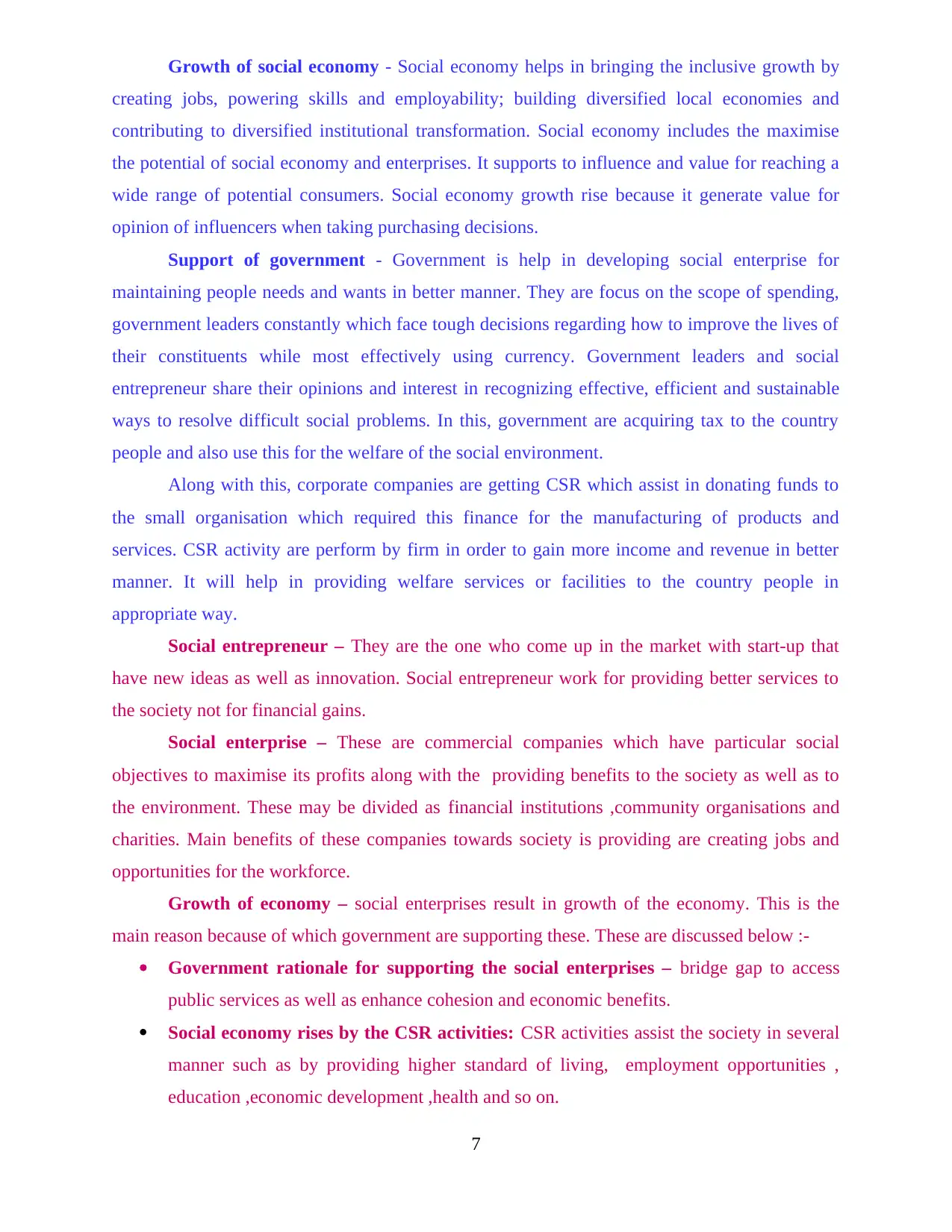
Growth of social economy - Social economy helps in bringing the inclusive growth by
creating jobs, powering skills and employability; building diversified local economies and
contributing to diversified institutional transformation. Social economy includes the maximise
the potential of social economy and enterprises. It supports to influence and value for reaching a
wide range of potential consumers. Social economy growth rise because it generate value for
opinion of influencers when taking purchasing decisions.
Support of government - Government is help in developing social enterprise for
maintaining people needs and wants in better manner. They are focus on the scope of spending,
government leaders constantly which face tough decisions regarding how to improve the lives of
their constituents while most effectively using currency. Government leaders and social
entrepreneur share their opinions and interest in recognizing effective, efficient and sustainable
ways to resolve difficult social problems. In this, government are acquiring tax to the country
people and also use this for the welfare of the social environment.
Along with this, corporate companies are getting CSR which assist in donating funds to
the small organisation which required this finance for the manufacturing of products and
services. CSR activity are perform by firm in order to gain more income and revenue in better
manner. It will help in providing welfare services or facilities to the country people in
appropriate way.
Social entrepreneur – They are the one who come up in the market with start-up that
have new ideas as well as innovation. Social entrepreneur work for providing better services to
the society not for financial gains.
Social enterprise – These are commercial companies which have particular social
objectives to maximise its profits along with the providing benefits to the society as well as to
the environment. These may be divided as financial institutions ,community organisations and
charities. Main benefits of these companies towards society is providing are creating jobs and
opportunities for the workforce.
Growth of economy – social enterprises result in growth of the economy. This is the
main reason because of which government are supporting these. These are discussed below :-
Government rationale for supporting the social enterprises – bridge gap to access
public services as well as enhance cohesion and economic benefits.
Social economy rises by the CSR activities: CSR activities assist the society in several
manner such as by providing higher standard of living, employment opportunities ,
education ,economic development ,health and so on.
7
creating jobs, powering skills and employability; building diversified local economies and
contributing to diversified institutional transformation. Social economy includes the maximise
the potential of social economy and enterprises. It supports to influence and value for reaching a
wide range of potential consumers. Social economy growth rise because it generate value for
opinion of influencers when taking purchasing decisions.
Support of government - Government is help in developing social enterprise for
maintaining people needs and wants in better manner. They are focus on the scope of spending,
government leaders constantly which face tough decisions regarding how to improve the lives of
their constituents while most effectively using currency. Government leaders and social
entrepreneur share their opinions and interest in recognizing effective, efficient and sustainable
ways to resolve difficult social problems. In this, government are acquiring tax to the country
people and also use this for the welfare of the social environment.
Along with this, corporate companies are getting CSR which assist in donating funds to
the small organisation which required this finance for the manufacturing of products and
services. CSR activity are perform by firm in order to gain more income and revenue in better
manner. It will help in providing welfare services or facilities to the country people in
appropriate way.
Social entrepreneur – They are the one who come up in the market with start-up that
have new ideas as well as innovation. Social entrepreneur work for providing better services to
the society not for financial gains.
Social enterprise – These are commercial companies which have particular social
objectives to maximise its profits along with the providing benefits to the society as well as to
the environment. These may be divided as financial institutions ,community organisations and
charities. Main benefits of these companies towards society is providing are creating jobs and
opportunities for the workforce.
Growth of economy – social enterprises result in growth of the economy. This is the
main reason because of which government are supporting these. These are discussed below :-
Government rationale for supporting the social enterprises – bridge gap to access
public services as well as enhance cohesion and economic benefits.
Social economy rises by the CSR activities: CSR activities assist the society in several
manner such as by providing higher standard of living, employment opportunities ,
education ,economic development ,health and so on.
7
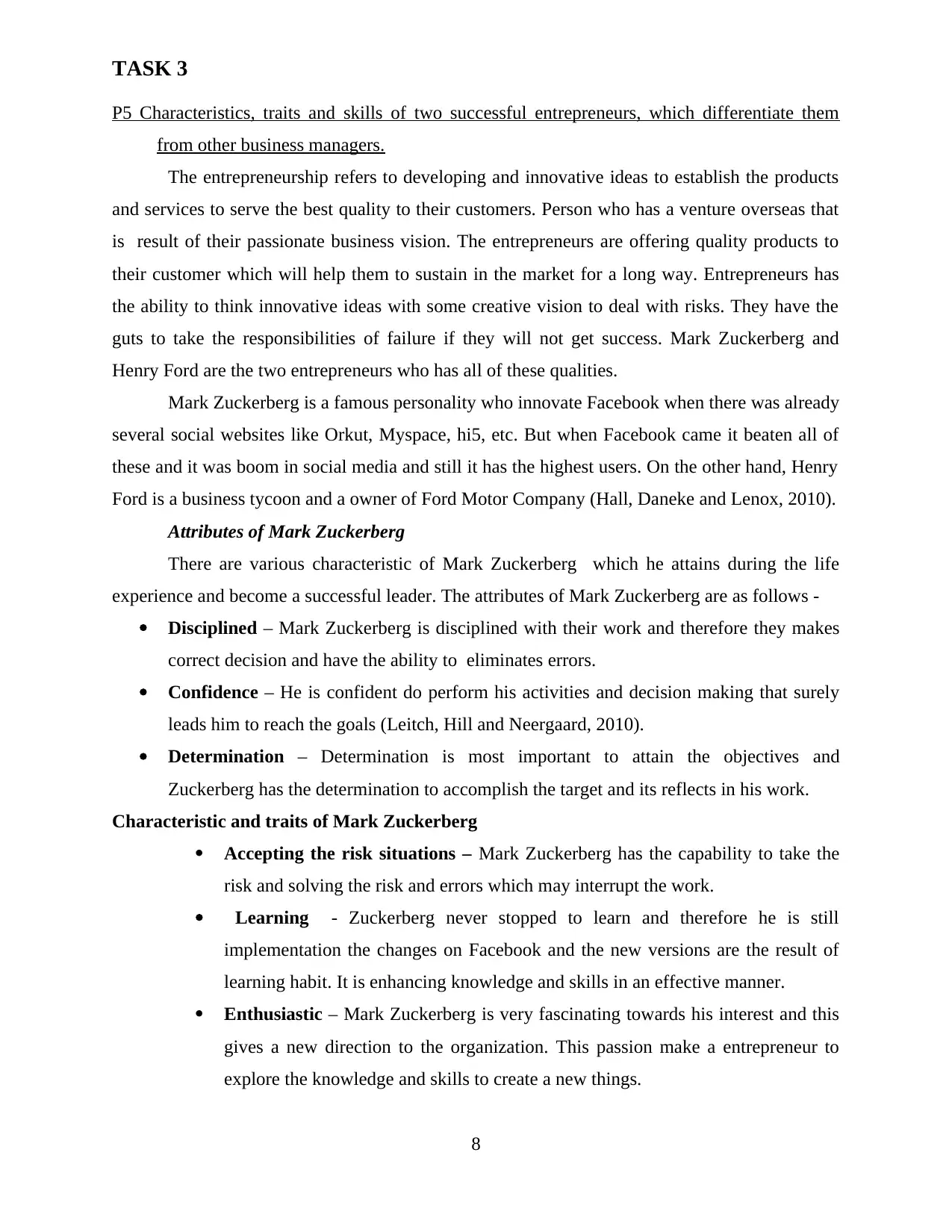
TASK 3
P5 Characteristics, traits and skills of two successful entrepreneurs, which differentiate them
from other business managers.
The entrepreneurship refers to developing and innovative ideas to establish the products
and services to serve the best quality to their customers. Person who has a venture overseas that
is result of their passionate business vision. The entrepreneurs are offering quality products to
their customer which will help them to sustain in the market for a long way. Entrepreneurs has
the ability to think innovative ideas with some creative vision to deal with risks. They have the
guts to take the responsibilities of failure if they will not get success. Mark Zuckerberg and
Henry Ford are the two entrepreneurs who has all of these qualities.
Mark Zuckerberg is a famous personality who innovate Facebook when there was already
several social websites like Orkut, Myspace, hi5, etc. But when Facebook came it beaten all of
these and it was boom in social media and still it has the highest users. On the other hand, Henry
Ford is a business tycoon and a owner of Ford Motor Company (Hall, Daneke and Lenox, 2010).
Attributes of Mark Zuckerberg
There are various characteristic of Mark Zuckerberg which he attains during the life
experience and become a successful leader. The attributes of Mark Zuckerberg are as follows -
Disciplined – Mark Zuckerberg is disciplined with their work and therefore they makes
correct decision and have the ability to eliminates errors.
Confidence – He is confident do perform his activities and decision making that surely
leads him to reach the goals (Leitch, Hill and Neergaard, 2010).
Determination – Determination is most important to attain the objectives and
Zuckerberg has the determination to accomplish the target and its reflects in his work.
Characteristic and traits of Mark Zuckerberg
Accepting the risk situations – Mark Zuckerberg has the capability to take the
risk and solving the risk and errors which may interrupt the work.
Learning - Zuckerberg never stopped to learn and therefore he is still
implementation the changes on Facebook and the new versions are the result of
learning habit. It is enhancing knowledge and skills in an effective manner.
Enthusiastic – Mark Zuckerberg is very fascinating towards his interest and this
gives a new direction to the organization. This passion make a entrepreneur to
explore the knowledge and skills to create a new things.
8
P5 Characteristics, traits and skills of two successful entrepreneurs, which differentiate them
from other business managers.
The entrepreneurship refers to developing and innovative ideas to establish the products
and services to serve the best quality to their customers. Person who has a venture overseas that
is result of their passionate business vision. The entrepreneurs are offering quality products to
their customer which will help them to sustain in the market for a long way. Entrepreneurs has
the ability to think innovative ideas with some creative vision to deal with risks. They have the
guts to take the responsibilities of failure if they will not get success. Mark Zuckerberg and
Henry Ford are the two entrepreneurs who has all of these qualities.
Mark Zuckerberg is a famous personality who innovate Facebook when there was already
several social websites like Orkut, Myspace, hi5, etc. But when Facebook came it beaten all of
these and it was boom in social media and still it has the highest users. On the other hand, Henry
Ford is a business tycoon and a owner of Ford Motor Company (Hall, Daneke and Lenox, 2010).
Attributes of Mark Zuckerberg
There are various characteristic of Mark Zuckerberg which he attains during the life
experience and become a successful leader. The attributes of Mark Zuckerberg are as follows -
Disciplined – Mark Zuckerberg is disciplined with their work and therefore they makes
correct decision and have the ability to eliminates errors.
Confidence – He is confident do perform his activities and decision making that surely
leads him to reach the goals (Leitch, Hill and Neergaard, 2010).
Determination – Determination is most important to attain the objectives and
Zuckerberg has the determination to accomplish the target and its reflects in his work.
Characteristic and traits of Mark Zuckerberg
Accepting the risk situations – Mark Zuckerberg has the capability to take the
risk and solving the risk and errors which may interrupt the work.
Learning - Zuckerberg never stopped to learn and therefore he is still
implementation the changes on Facebook and the new versions are the result of
learning habit. It is enhancing knowledge and skills in an effective manner.
Enthusiastic – Mark Zuckerberg is very fascinating towards his interest and this
gives a new direction to the organization. This passion make a entrepreneur to
explore the knowledge and skills to create a new things.
8
Secure Best Marks with AI Grader
Need help grading? Try our AI Grader for instant feedback on your assignments.
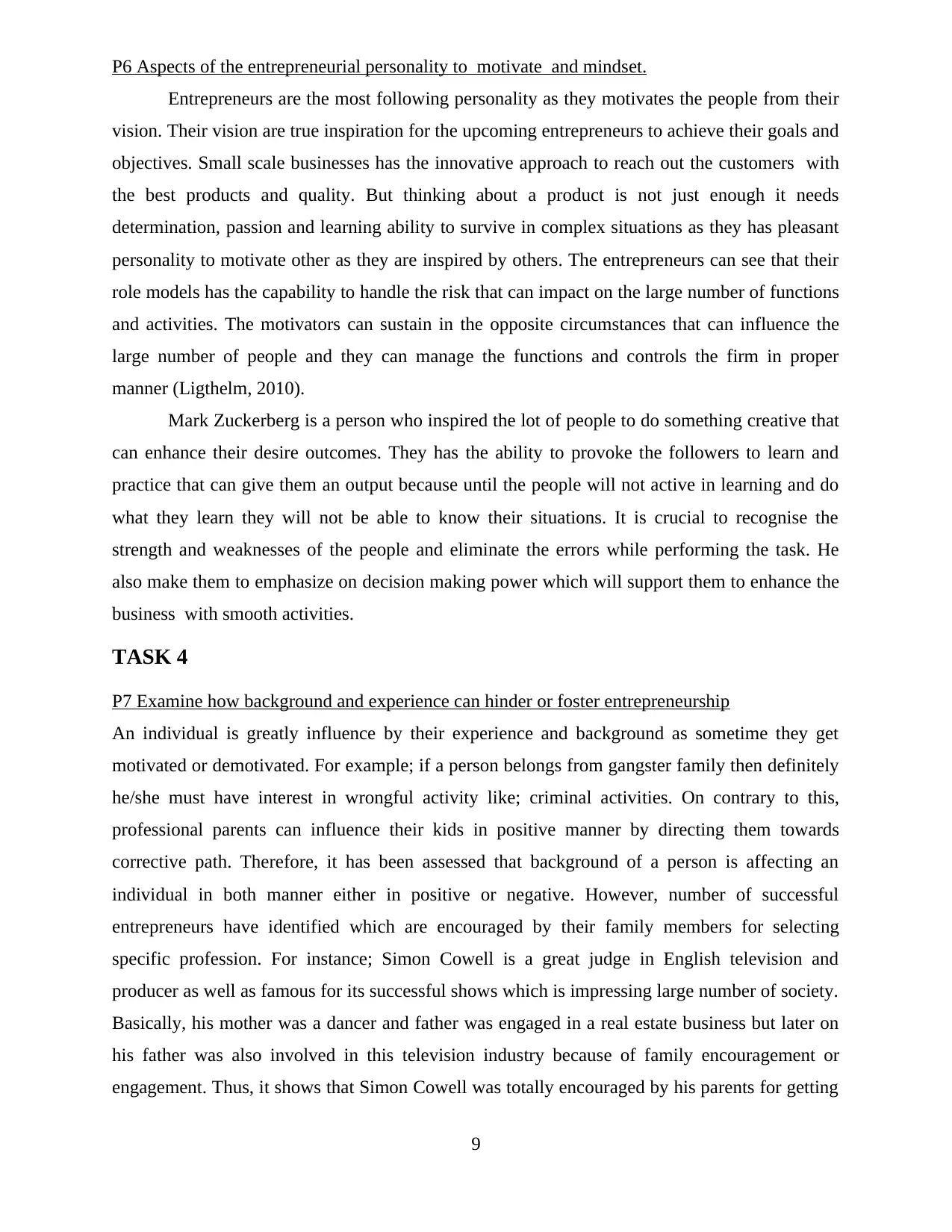
P6 Aspects of the entrepreneurial personality to motivate and mindset.
Entrepreneurs are the most following personality as they motivates the people from their
vision. Their vision are true inspiration for the upcoming entrepreneurs to achieve their goals and
objectives. Small scale businesses has the innovative approach to reach out the customers with
the best products and quality. But thinking about a product is not just enough it needs
determination, passion and learning ability to survive in complex situations as they has pleasant
personality to motivate other as they are inspired by others. The entrepreneurs can see that their
role models has the capability to handle the risk that can impact on the large number of functions
and activities. The motivators can sustain in the opposite circumstances that can influence the
large number of people and they can manage the functions and controls the firm in proper
manner (Ligthelm, 2010).
Mark Zuckerberg is a person who inspired the lot of people to do something creative that
can enhance their desire outcomes. They has the ability to provoke the followers to learn and
practice that can give them an output because until the people will not active in learning and do
what they learn they will not be able to know their situations. It is crucial to recognise the
strength and weaknesses of the people and eliminate the errors while performing the task. He
also make them to emphasize on decision making power which will support them to enhance the
business with smooth activities.
TASK 4
P7 Examine how background and experience can hinder or foster entrepreneurship
An individual is greatly influence by their experience and background as sometime they get
motivated or demotivated. For example; if a person belongs from gangster family then definitely
he/she must have interest in wrongful activity like; criminal activities. On contrary to this,
professional parents can influence their kids in positive manner by directing them towards
corrective path. Therefore, it has been assessed that background of a person is affecting an
individual in both manner either in positive or negative. However, number of successful
entrepreneurs have identified which are encouraged by their family members for selecting
specific profession. For instance; Simon Cowell is a great judge in English television and
producer as well as famous for its successful shows which is impressing large number of society.
Basically, his mother was a dancer and father was engaged in a real estate business but later on
his father was also involved in this television industry because of family encouragement or
engagement. Thus, it shows that Simon Cowell was totally encouraged by his parents for getting
9
Entrepreneurs are the most following personality as they motivates the people from their
vision. Their vision are true inspiration for the upcoming entrepreneurs to achieve their goals and
objectives. Small scale businesses has the innovative approach to reach out the customers with
the best products and quality. But thinking about a product is not just enough it needs
determination, passion and learning ability to survive in complex situations as they has pleasant
personality to motivate other as they are inspired by others. The entrepreneurs can see that their
role models has the capability to handle the risk that can impact on the large number of functions
and activities. The motivators can sustain in the opposite circumstances that can influence the
large number of people and they can manage the functions and controls the firm in proper
manner (Ligthelm, 2010).
Mark Zuckerberg is a person who inspired the lot of people to do something creative that
can enhance their desire outcomes. They has the ability to provoke the followers to learn and
practice that can give them an output because until the people will not active in learning and do
what they learn they will not be able to know their situations. It is crucial to recognise the
strength and weaknesses of the people and eliminate the errors while performing the task. He
also make them to emphasize on decision making power which will support them to enhance the
business with smooth activities.
TASK 4
P7 Examine how background and experience can hinder or foster entrepreneurship
An individual is greatly influence by their experience and background as sometime they get
motivated or demotivated. For example; if a person belongs from gangster family then definitely
he/she must have interest in wrongful activity like; criminal activities. On contrary to this,
professional parents can influence their kids in positive manner by directing them towards
corrective path. Therefore, it has been assessed that background of a person is affecting an
individual in both manner either in positive or negative. However, number of successful
entrepreneurs have identified which are encouraged by their family members for selecting
specific profession. For instance; Simon Cowell is a great judge in English television and
producer as well as famous for its successful shows which is impressing large number of society.
Basically, his mother was a dancer and father was engaged in a real estate business but later on
his father was also involved in this television industry because of family encouragement or
engagement. Thus, it shows that Simon Cowell was totally encouraged by his parents for getting
9
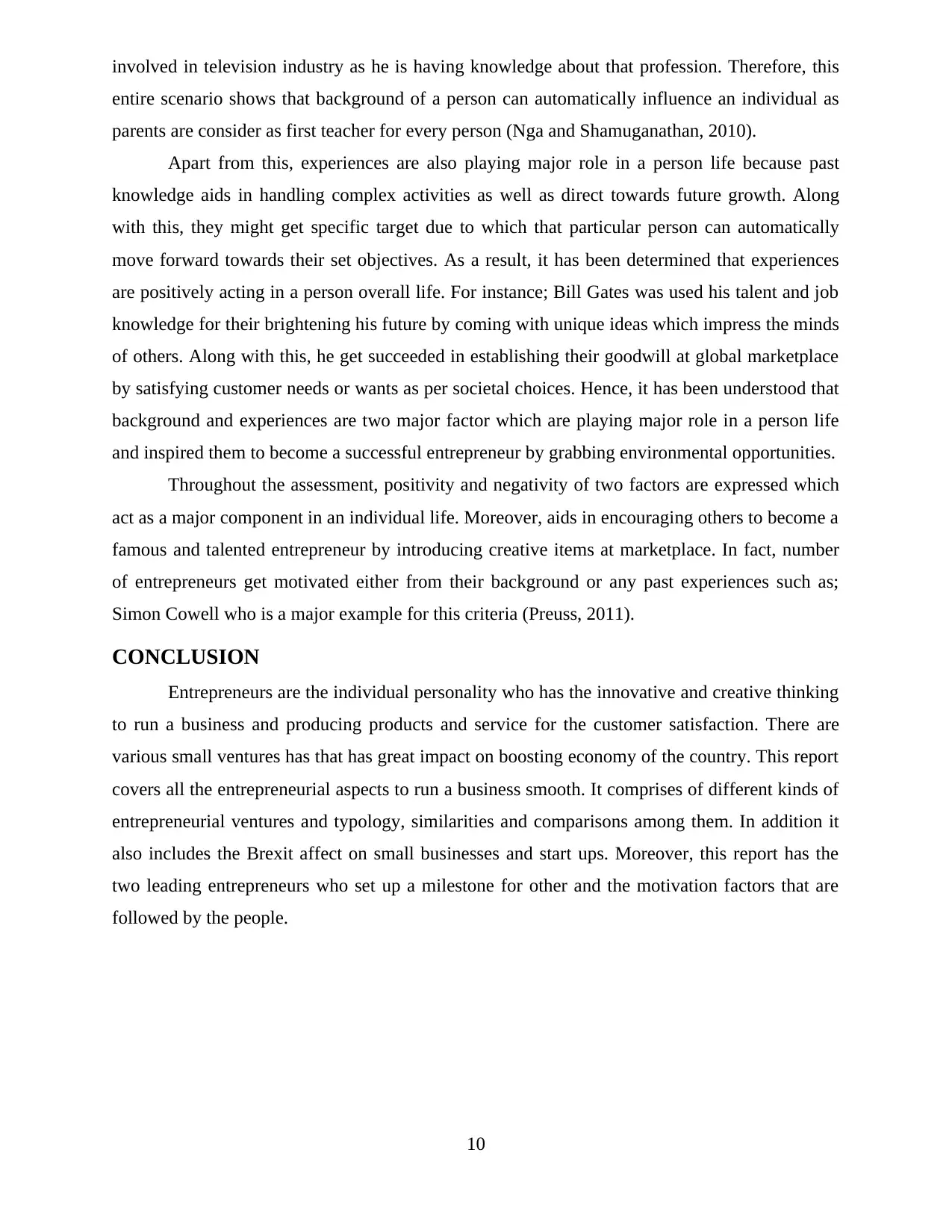
involved in television industry as he is having knowledge about that profession. Therefore, this
entire scenario shows that background of a person can automatically influence an individual as
parents are consider as first teacher for every person (Nga and Shamuganathan, 2010).
Apart from this, experiences are also playing major role in a person life because past
knowledge aids in handling complex activities as well as direct towards future growth. Along
with this, they might get specific target due to which that particular person can automatically
move forward towards their set objectives. As a result, it has been determined that experiences
are positively acting in a person overall life. For instance; Bill Gates was used his talent and job
knowledge for their brightening his future by coming with unique ideas which impress the minds
of others. Along with this, he get succeeded in establishing their goodwill at global marketplace
by satisfying customer needs or wants as per societal choices. Hence, it has been understood that
background and experiences are two major factor which are playing major role in a person life
and inspired them to become a successful entrepreneur by grabbing environmental opportunities.
Throughout the assessment, positivity and negativity of two factors are expressed which
act as a major component in an individual life. Moreover, aids in encouraging others to become a
famous and talented entrepreneur by introducing creative items at marketplace. In fact, number
of entrepreneurs get motivated either from their background or any past experiences such as;
Simon Cowell who is a major example for this criteria (Preuss, 2011).
CONCLUSION
Entrepreneurs are the individual personality who has the innovative and creative thinking
to run a business and producing products and service for the customer satisfaction. There are
various small ventures has that has great impact on boosting economy of the country. This report
covers all the entrepreneurial aspects to run a business smooth. It comprises of different kinds of
entrepreneurial ventures and typology, similarities and comparisons among them. In addition it
also includes the Brexit affect on small businesses and start ups. Moreover, this report has the
two leading entrepreneurs who set up a milestone for other and the motivation factors that are
followed by the people.
10
entire scenario shows that background of a person can automatically influence an individual as
parents are consider as first teacher for every person (Nga and Shamuganathan, 2010).
Apart from this, experiences are also playing major role in a person life because past
knowledge aids in handling complex activities as well as direct towards future growth. Along
with this, they might get specific target due to which that particular person can automatically
move forward towards their set objectives. As a result, it has been determined that experiences
are positively acting in a person overall life. For instance; Bill Gates was used his talent and job
knowledge for their brightening his future by coming with unique ideas which impress the minds
of others. Along with this, he get succeeded in establishing their goodwill at global marketplace
by satisfying customer needs or wants as per societal choices. Hence, it has been understood that
background and experiences are two major factor which are playing major role in a person life
and inspired them to become a successful entrepreneur by grabbing environmental opportunities.
Throughout the assessment, positivity and negativity of two factors are expressed which
act as a major component in an individual life. Moreover, aids in encouraging others to become a
famous and talented entrepreneur by introducing creative items at marketplace. In fact, number
of entrepreneurs get motivated either from their background or any past experiences such as;
Simon Cowell who is a major example for this criteria (Preuss, 2011).
CONCLUSION
Entrepreneurs are the individual personality who has the innovative and creative thinking
to run a business and producing products and service for the customer satisfaction. There are
various small ventures has that has great impact on boosting economy of the country. This report
covers all the entrepreneurial aspects to run a business smooth. It comprises of different kinds of
entrepreneurial ventures and typology, similarities and comparisons among them. In addition it
also includes the Brexit affect on small businesses and start ups. Moreover, this report has the
two leading entrepreneurs who set up a milestone for other and the motivation factors that are
followed by the people.
10
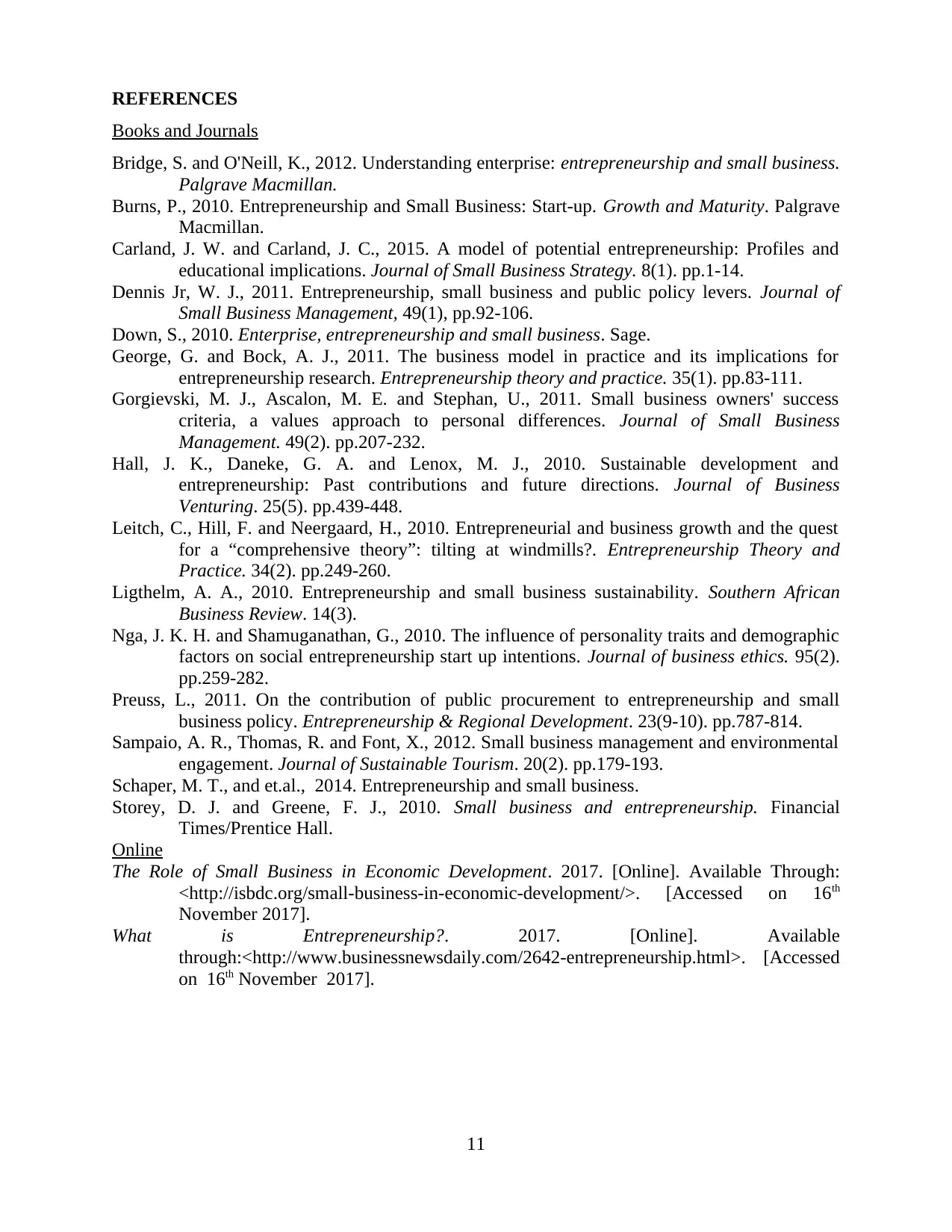
REFERENCES
Books and Journals
Bridge, S. and O'Neill, K., 2012. Understanding enterprise: entrepreneurship and small business.
Palgrave Macmillan.
Burns, P., 2010. Entrepreneurship and Small Business: Start-up. Growth and Maturity. Palgrave
Macmillan.
Carland, J. W. and Carland, J. C., 2015. A model of potential entrepreneurship: Profiles and
educational implications. Journal of Small Business Strategy. 8(1). pp.1-14.
Dennis Jr, W. J., 2011. Entrepreneurship, small business and public policy levers. Journal of
Small Business Management, 49(1), pp.92-106.
Down, S., 2010. Enterprise, entrepreneurship and small business. Sage.
George, G. and Bock, A. J., 2011. The business model in practice and its implications for
entrepreneurship research. Entrepreneurship theory and practice. 35(1). pp.83-111.
Gorgievski, M. J., Ascalon, M. E. and Stephan, U., 2011. Small business owners' success
criteria, a values approach to personal differences. Journal of Small Business
Management. 49(2). pp.207-232.
Hall, J. K., Daneke, G. A. and Lenox, M. J., 2010. Sustainable development and
entrepreneurship: Past contributions and future directions. Journal of Business
Venturing. 25(5). pp.439-448.
Leitch, C., Hill, F. and Neergaard, H., 2010. Entrepreneurial and business growth and the quest
for a “comprehensive theory”: tilting at windmills?. Entrepreneurship Theory and
Practice. 34(2). pp.249-260.
Ligthelm, A. A., 2010. Entrepreneurship and small business sustainability. Southern African
Business Review. 14(3).
Nga, J. K. H. and Shamuganathan, G., 2010. The influence of personality traits and demographic
factors on social entrepreneurship start up intentions. Journal of business ethics. 95(2).
pp.259-282.
Preuss, L., 2011. On the contribution of public procurement to entrepreneurship and small
business policy. Entrepreneurship & Regional Development. 23(9-10). pp.787-814.
Sampaio, A. R., Thomas, R. and Font, X., 2012. Small business management and environmental
engagement. Journal of Sustainable Tourism. 20(2). pp.179-193.
Schaper, M. T., and et.al., 2014. Entrepreneurship and small business.
Storey, D. J. and Greene, F. J., 2010. Small business and entrepreneurship. Financial
Times/Prentice Hall.
Online
The Role of Small Business in Economic Development. 2017. [Online]. Available Through:
<http://isbdc.org/small-business-in-economic-development/>. [Accessed on 16th
November 2017].
What is Entrepreneurship?. 2017. [Online]. Available
through:<http://www.businessnewsdaily.com/2642-entrepreneurship.html>. [Accessed
on 16th November 2017].
11
Books and Journals
Bridge, S. and O'Neill, K., 2012. Understanding enterprise: entrepreneurship and small business.
Palgrave Macmillan.
Burns, P., 2010. Entrepreneurship and Small Business: Start-up. Growth and Maturity. Palgrave
Macmillan.
Carland, J. W. and Carland, J. C., 2015. A model of potential entrepreneurship: Profiles and
educational implications. Journal of Small Business Strategy. 8(1). pp.1-14.
Dennis Jr, W. J., 2011. Entrepreneurship, small business and public policy levers. Journal of
Small Business Management, 49(1), pp.92-106.
Down, S., 2010. Enterprise, entrepreneurship and small business. Sage.
George, G. and Bock, A. J., 2011. The business model in practice and its implications for
entrepreneurship research. Entrepreneurship theory and practice. 35(1). pp.83-111.
Gorgievski, M. J., Ascalon, M. E. and Stephan, U., 2011. Small business owners' success
criteria, a values approach to personal differences. Journal of Small Business
Management. 49(2). pp.207-232.
Hall, J. K., Daneke, G. A. and Lenox, M. J., 2010. Sustainable development and
entrepreneurship: Past contributions and future directions. Journal of Business
Venturing. 25(5). pp.439-448.
Leitch, C., Hill, F. and Neergaard, H., 2010. Entrepreneurial and business growth and the quest
for a “comprehensive theory”: tilting at windmills?. Entrepreneurship Theory and
Practice. 34(2). pp.249-260.
Ligthelm, A. A., 2010. Entrepreneurship and small business sustainability. Southern African
Business Review. 14(3).
Nga, J. K. H. and Shamuganathan, G., 2010. The influence of personality traits and demographic
factors on social entrepreneurship start up intentions. Journal of business ethics. 95(2).
pp.259-282.
Preuss, L., 2011. On the contribution of public procurement to entrepreneurship and small
business policy. Entrepreneurship & Regional Development. 23(9-10). pp.787-814.
Sampaio, A. R., Thomas, R. and Font, X., 2012. Small business management and environmental
engagement. Journal of Sustainable Tourism. 20(2). pp.179-193.
Schaper, M. T., and et.al., 2014. Entrepreneurship and small business.
Storey, D. J. and Greene, F. J., 2010. Small business and entrepreneurship. Financial
Times/Prentice Hall.
Online
The Role of Small Business in Economic Development. 2017. [Online]. Available Through:
<http://isbdc.org/small-business-in-economic-development/>. [Accessed on 16th
November 2017].
What is Entrepreneurship?. 2017. [Online]. Available
through:<http://www.businessnewsdaily.com/2642-entrepreneurship.html>. [Accessed
on 16th November 2017].
11
Paraphrase This Document
Need a fresh take? Get an instant paraphrase of this document with our AI Paraphraser

12

13
1 out of 15
Related Documents
Your All-in-One AI-Powered Toolkit for Academic Success.
+13062052269
info@desklib.com
Available 24*7 on WhatsApp / Email
![[object Object]](/_next/static/media/star-bottom.7253800d.svg)
Unlock your academic potential
© 2024 | Zucol Services PVT LTD | All rights reserved.





